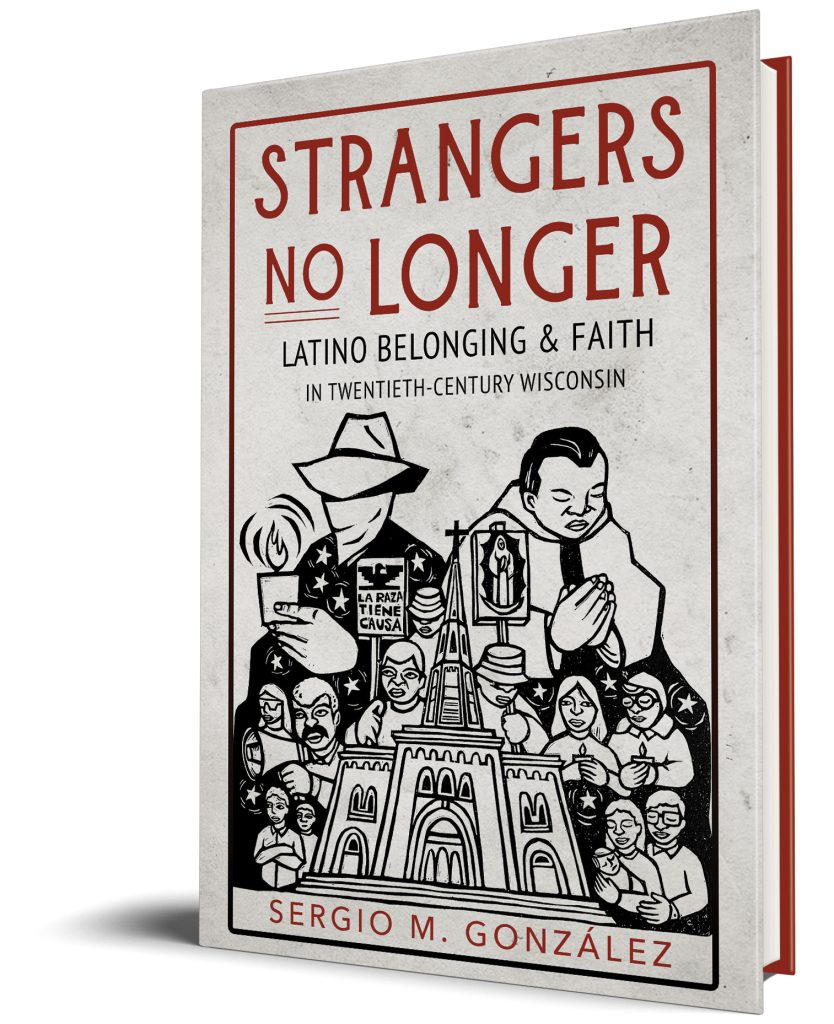Sergio M. González, the author of Strangers No Longer: Latino Belonging and Faith in Twentieth-Century Wisconsin, answers questions on his new book.
Q: Why did you decide to write this book?
The 2020 U.S. Census revealed that Latinos now constitute the largest minority population in Wisconsin. It’s a trend that is picking up across the Midwest as Latino newcomers migrate to the region in search of better employment and living conditions. As a historian, son of immigrants from Mexico, and a lifelong resident of Wisconsin, I wanted to place these recent demographic shifts in a longer historical narrative, not only to better understand the reasons why Latinos have migrated to the Midwest but also to dispel the persistent narrative that these people are only recent arrivals to the region. Strangers No Longer shows that Latinos have been coming to Wisconsin for over a hundred years for many different reasons, whether it’s to work in the state’s once-booming tanneries and foundries in the early twentieth century, as essential laborers saving the state’s agricultural economy in the postwar years, or to flee persecution in their home countries in the last decades of the century. In each instance, however, they’ve had to regularly push back against the idea that they are only temporary sojourners or guests with no license to claim belonging, social standing, or political power in the United States. To better understand the varied forms of welcome they’ve encountered in the state, I focus particularly on Latinos’ faith and their connection to religious institutions as spaces of hospitality. In houses of worship, migrant ministry programs, and faith-based social service agencies, Wisconsin Latinos found practices of hospitality that ranged from coercive forms of assimilation to radical efforts to create sanctuary for those seeking safe harbor from detention and deportation.
Q: What is the most interesting discovery you made while researching and writing your book?
Research for each chapter of this book brought opportunities to learn more about a place that I’ve called home for my entire life. I was most surprised to learn that Milwaukee, Wisconsin served as an important hub of the 1980s sanctuary movement, a transnational effort to support Salvadorans and Guatemalans who were fleeing violence in their home countries while facing an American government that refused to offer them political asylum. Thanks to the work of a coalition of interfaith laity and clergy deeply concerned with the plight of Central Americans and disturbed by the United States’ role in destabilizing these peoples’ countries, Milwaukee became the first city with Latino, Black, and Jewish houses of worship that served as places of safe harbor for these asylum seekers. These people of faith opened the doors of their sacred homes to newcomers despite facing FBI surveillance and potential criminal charges for harboring undocumented people. They justified their actions by drawing upon scriptural injunctions to welcome the stranger, shared histories of seeking refuge, and Milwaukee’s history as a stop on the nineteenth-century Underground Railroad. After nearly a decade of activism, sanctuary activists successfully forced the federal government to allow hundreds of thousands of Central Americans to apply for asylum in the United States.
Q: What myths do you hope your book will dispel or what do you hope your book will help readers unlearn?
Despite their century-long presence in the region, Latinos are still consistently perceived as newcomers to the Midwest. As ‘forever guests,’ they remain at the nominal threshold of belonging in their communities, struggling to obtain and hold economic, social, and political power in the places that their forebearers may have called home for decades. With Strangers No Longer, I hope to dispel that historical amnesia and demonstrate that Latinos have been an essential and vibrant part of the region’s history and growth over the last one hundred years, and that they’ll continue to make an impact on the Midwest for decades to come.
Q: Which part of the publishing process did you find the most interesting?
The process of finding the right fit for a publisher for Strangers No Longer was both illuminating and at times frustrating. As a practice of due diligence, I talked to editors at different academic presses as I began to prepare my final manuscript draft. Unfortunately, I found that some of them didn’t seem to understand why readers would be interested in engaging with an entire book about Latinos in Wisconsin. In some ways, it seemed to prove one of the book’s larger points, that the history of this population remains largely misunderstood and unknown both by academics and a broader audience, despite the growing demographic presence of Latinos in the Midwest. The editorial team at the University of Illinois Press’ Latinos in Chicago and the Midwest series, however, never needed convincing. I found that their regional focus and openness to interdisciplinary approaches made the series the best home for this project.
Q: What is your advice to scholars/authors who want to take on a similar project?
Don’t get frustrated if traditional archival resources don’t initially provide you with the sources you need to tell these histories. As I started research for this book, I found that historical societies hadn’t done an adequate job of preserving the institutional records, personal papers, periodicals, or photographs of the individuals and communities I needed to engage with to better understand the history of Latinos in Wisconsin. That meant I had to take on a long but very fulfilling process of archival retrieval, working with community members to record oral histories, collect family remembrances, and compile activist organizations’ records.
Sergio M. González is an assistant professor of history at Marquette University. He is the author of Mexicans in Wisconsin.

